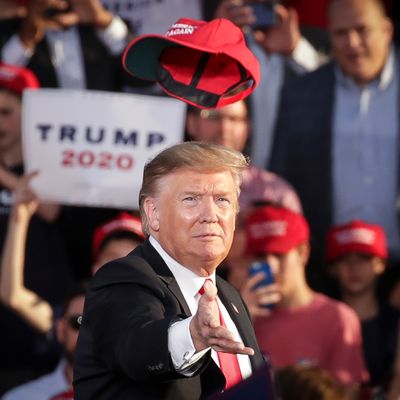
After the president faced a wave of criticism for announcing a rally on Juneteenth in Tulsa, Oklahoma — a city still reckoning with one of the worst acts of racist violence in the nation’s history — his campaign decided to move the show to Saturday, June 20. But the Tulsa health director is requesting that Trump push the date even further into the summer to mitigate the potential of a super-spreader event as the state faces record days of new coronavirus cases.
On Saturday, Tulsa City-County Health Department director Dr. Bruce Dart told the Tulsa World that the city is experiencing a “significant increase in our case trends” that could put Trump at the risk of exposure himself. “I think it’s an honor for Tulsa to have a sitting president want to come and visit our community, but not during a pandemic,” said Dart. “I’m concerned about our ability to protect anyone who attends a large, indoor event, and I’m also concerned about our ability to ensure the president stays safe as well.”
Though Oklahoma has not faced a significant outbreak to date, as the state enters phase three of reopening — which allows public gatherings of any size as long as attendees practice social distancing — Tulsa County is handling a record number of cases. The health department reports that the county’s seven-day rolling average for COVID-19 cases has spiked from 24.9 cases on June 7 to 51.4 on June 12, while data from state officials shows that 225 new cases of the virus were announced on June 13, the highest single-day case count of the pandemic. “COVID is here in Tulsa, it is transmitting very efficiently,” Dart said. “I wish we could postpone this to a time when the virus isn’t as large a concern as it is today.”
Public-health experts across the country are warning of the potential danger for such a gathering in an enclosed space. Dr. Ashish Jha, director of Harvard’s Global Health Institute, told the Associated Press that the rally is “an extraordinarily dangerous move for the people participating and the people who may know them and love them and see them afterward,” adding that he would “feel the same way if Joe Biden were holding a rally.” Shelley Payne, director of the LaMontagne Center for Infectious Disease at the University of Texas at Austin, told the AP that the rally could create a significant risk of community spread when attendees return home, adding that she would “certainly recommend that people wear masks and try to keep as much distance as possible.”
The president doesn’t appear to be too keen on that recommendation, however. The Trump campaign has declined to answer several questions on whether or not it will require attendees to wear masks in the indoor Bank of Oklahoma Center. And in April, Trump let the public know his thoughts on social distancing at his 2020 tour stops: “I can’t imagine a rally where you have every fourth seat full. Every six seats are empty for every one that you have full. That wouldn’t look too good.”
Meanwhile, the usual shoddy math of the Trump era marches forward. On Friday, campaign manager Brad Parscale claimed that they had sold over 200,000 tickets for the president’s first rally since March. (“And it’s not even political season,” he said in his announcement, despite the tens of thousands of protesters marching with PPE in the streets.) But Parscale’s number is over ten times the maximum capacity of the venue, social distancing or no.






























